By Julia Lang and Mehr Manzoor
Our Taylor Your Life for Graduate Students workshop was just two weeks into its 5-week series when Tulane University announced campus was closing and all classes and programs would be moved online due to the COVID-19 crisis.
Like countless universities around the nation, we were presented with the challenge to pivot quickly and keep energy and motivation high among participants.
Now more than ever, we were determined to design an interactive online experience to support graduate students in the daunting task of restructuring their lives and engaging in completely new ways of working, parenting, socializing, studying, and reevaluating career opportunities after graduate school amidst an international pandemic that was impacting nearly every industry and organization around the world.
This post highlights some of the tools we found helpful when pivoting our class online.
Tools for Transitioning to Zoom Classroom
On Friday, March 27th, 14 motivated participants warily logged on to zoom for our first online classroom, joining remotely from homes, backyards, and even cars in parking lots, taking a pause from buying essential supplies.
Zoom Break-out Rooms
Using the break-out room feature in zoom, we immediately broke students into smaller groups so they could reconnect and check in with each other, sharing one way they were struggling and one positive benefit from this restructuring in their life due to COVID-19. Students also shared experiments they were running to test different life design pathways and ways in which they could continue to life design “prototypes” in a remote work environment. By beginning the session in this way, we immediately oriented ourselves back in a core mindset of design thinking, empathy, creating space for participants to hear and validate each other’s realities.
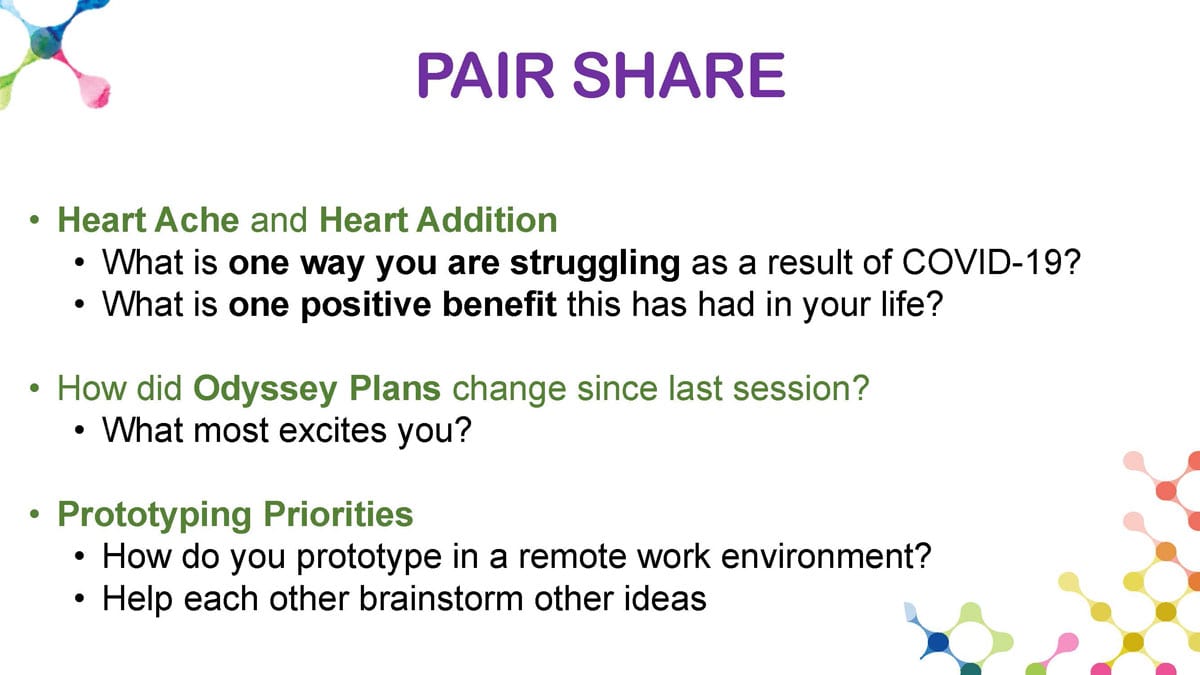
Students were then given time to gather their thoughts about their current life design by filling out quick sentence stems and entering it into the “chat” for all to see and reflect upon
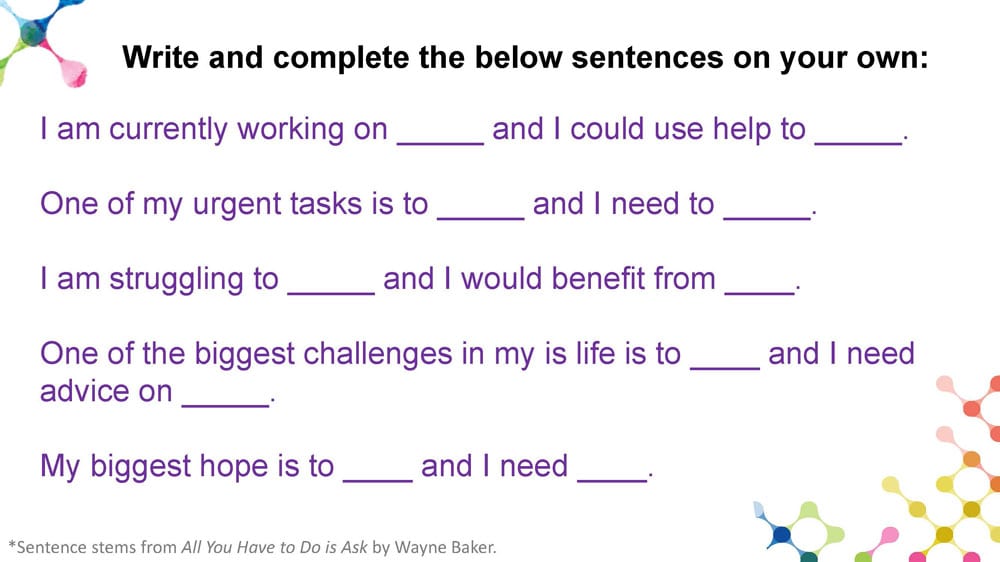
Using Google Docs
We then jumped into an experiment in online networking by sharing a link to a joint google document that allowed the entire group to brainstorm and see each other’s responses in real time.
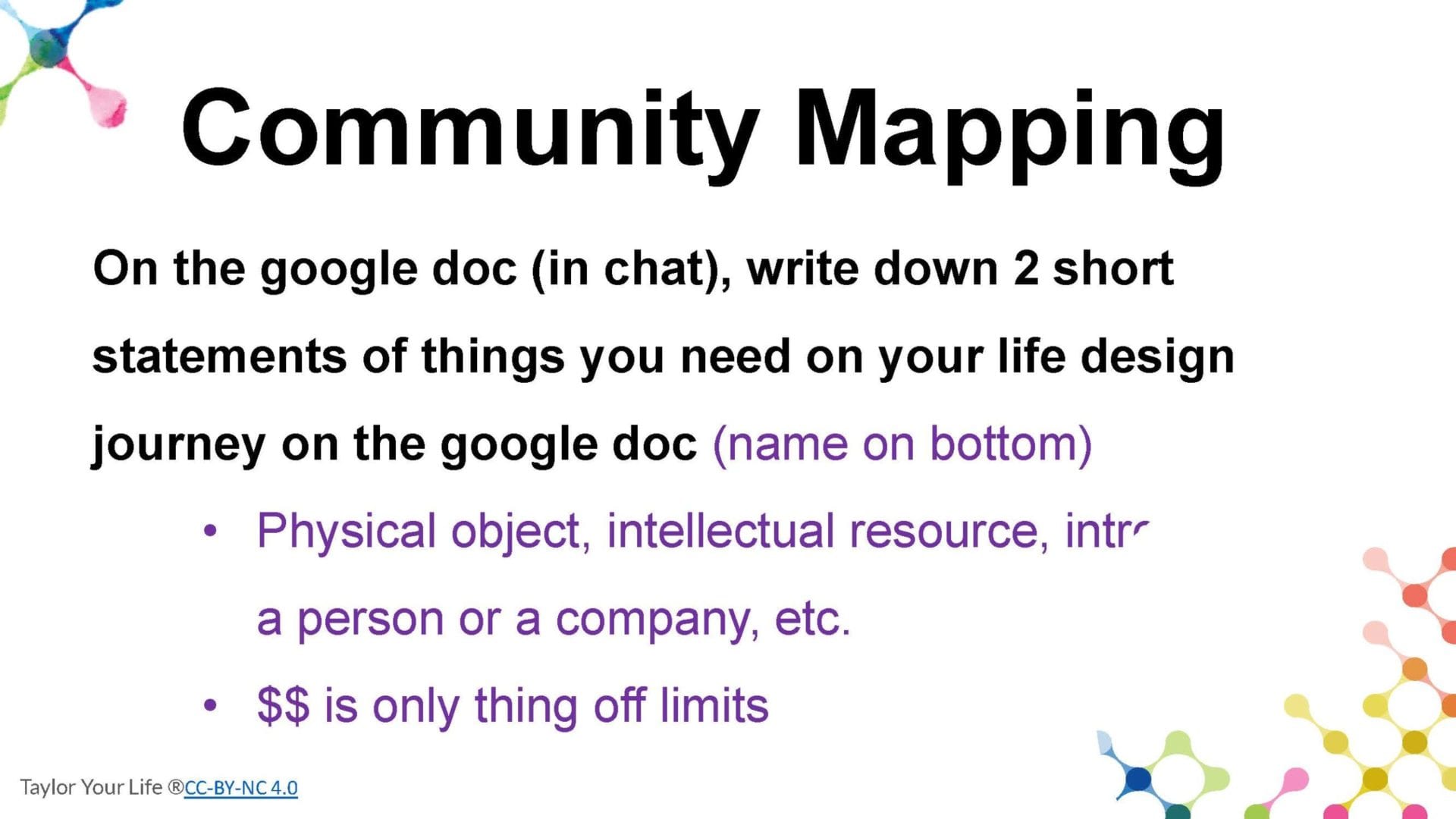
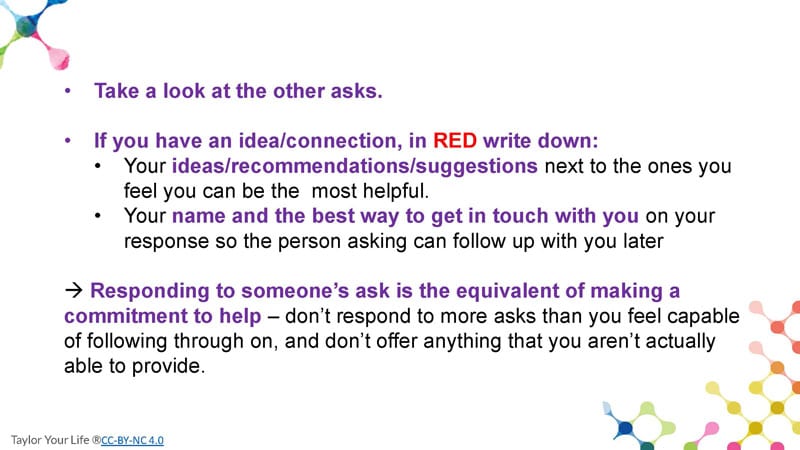
Participants were instructed to write two short statements of needs in their life design journey. The entire group could then see each need and respond in real time with suggestions, resources, and referrals.
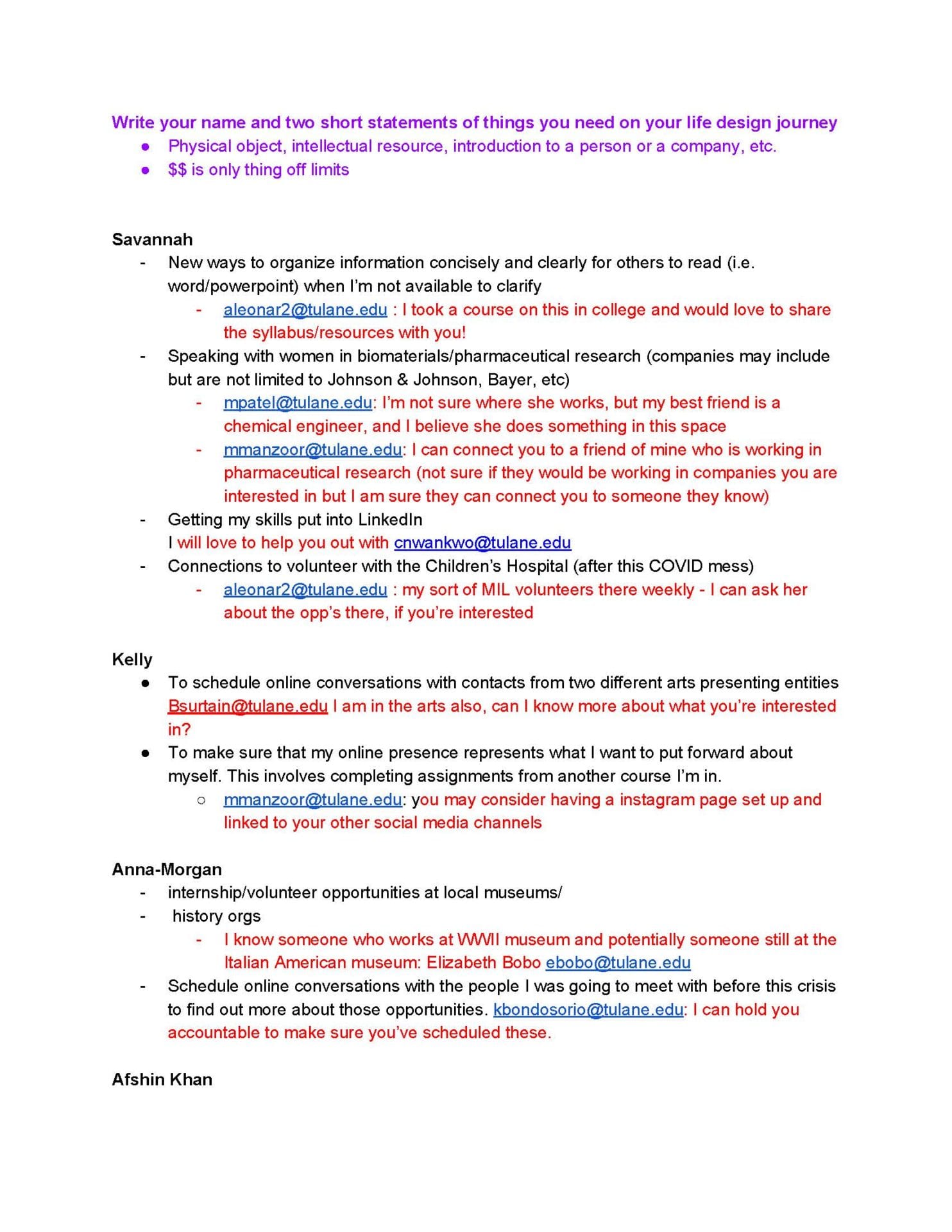
In less than 10 minutes, the joint google doc had dozens of ideas. As a class, we then reflected on the activity as a whole to see which questions generated the most ideas, with students reflecting how they must frame their networking “ask” as a specific question that is not too broad or too narrow to generate the most responses and ideas.
The session concluded with suggestions for how students could continue to prototype and experiment different professional pathways while in quarantine.
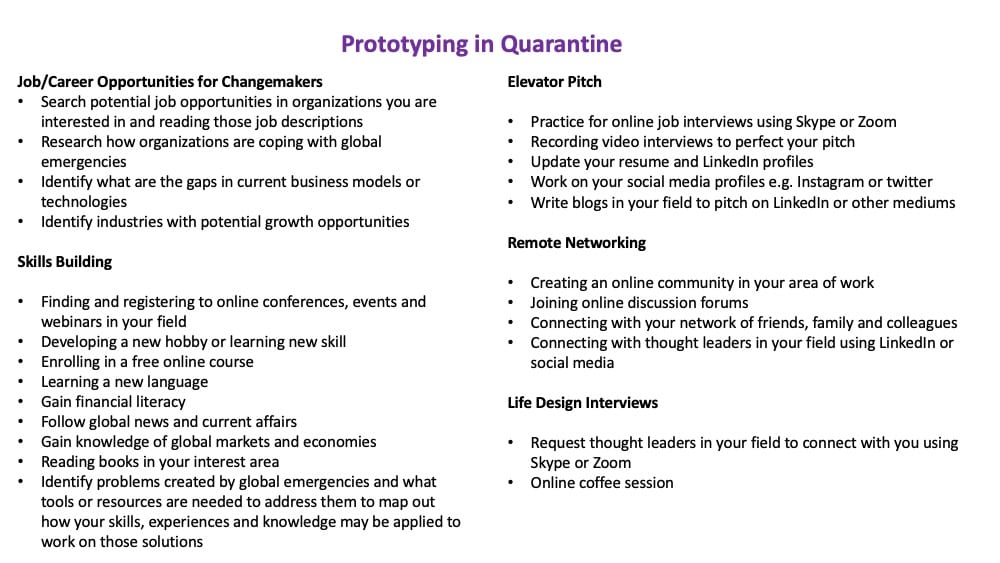
Thinking like a design thinker
This session reinforced that now, more than ever is the time to think like a design thinker and practice mindsets we teach about in our Taylor Your Life (life design) classes such as:
- Empathy: We are all experiencing and figuring this out together- students, instructors, parents, government leaders, school administrators, etc.!)
- Learning and pivoting quickly as we see from what fails in our first few weeks switching to online education: I promised them that not everything will go as planned, and
- Prototyping and testing our way forward together as a community.
Student Feedback
To model how we are learning and pivoting quickly, we dropped a final link to a Feedback Document (google doc) in the chat that to get anonymous feedback in real-time from participants about what they the liked, what they would change for future sessions, and what ideas they have for future sessions.
By prototyping and testing our own way forward with the course and being transparent with students every step of the way, we were able to pivot and create a high-quality life design experience for graduate students, as noted in a student reflection about the series:
“I think this should be a required course. I use the tools that I have learned in this course so frequently. I wish I were aware of them years ago. I have even been giving other people recommendations that I have learned from this course. I am scheduled to meet with a potential employer today and that opportunity happened as a result of actions taken during this course. My greatest takeaway is that everyone needs to implement the tools learned within this course.”
– a participant in TYL 4 Grads workshop in Spring 20202.
That said, we learned a lot along the way and have a lot yet to learn!
Lessons Learned
Fast forward a month from that first online session, we successfully completed the workshop series online. Learning trial by fire, some tips we picked up along the way include
- Sharing your computer sound and playing high-quality music for participants. When you select “share screen” click the button in the lower-left corner that says, “share computer sound.” This way, you can provide high-quality music for all participants during activities or transitions.
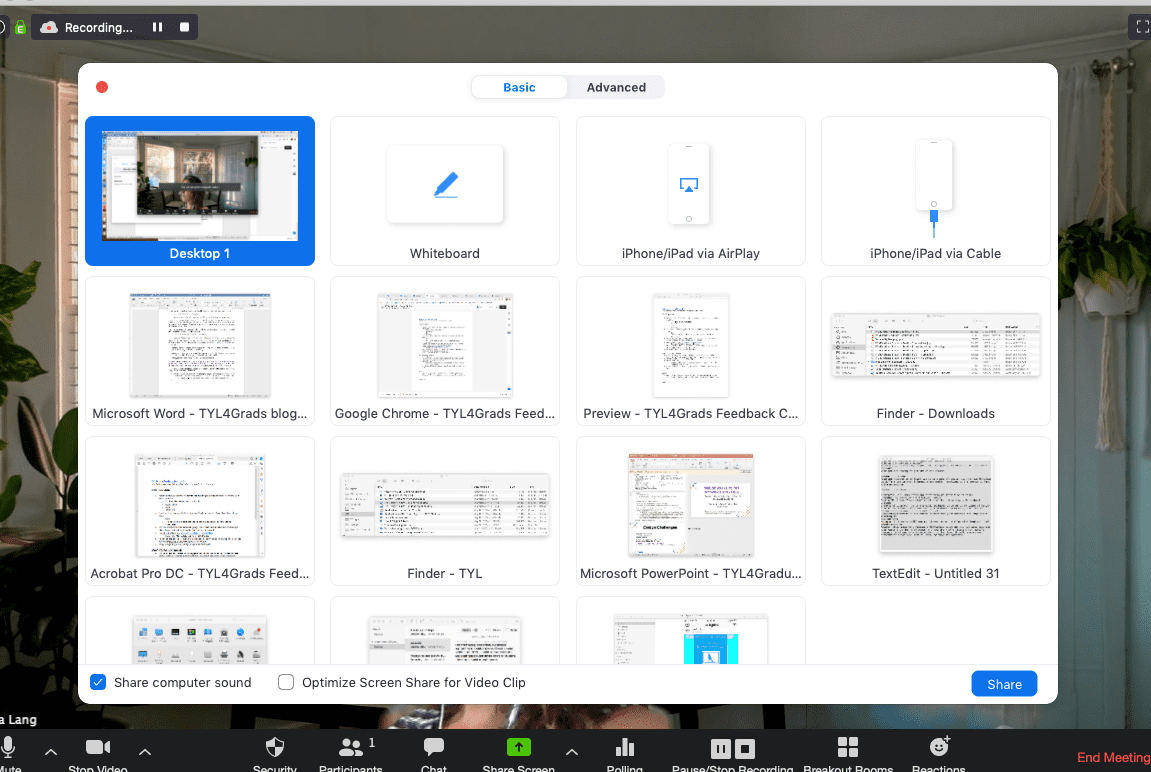
- Switching it up! Change learning activities/technology at least every 10 minutes. Incorporate ways for students to engage online during class, such as creating a google PowerPoint presentation and give each student a different page. Have them import a screenshot of an activity they worked on during class into the joint presentation for everyone to see. Tip: students can draw in real-time in any browser with whiteboardfox.com.
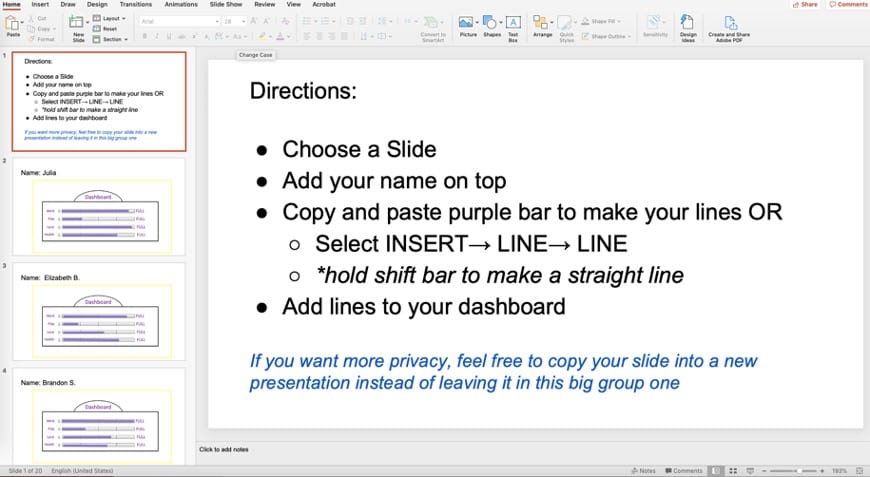
- Using break out rooms but be careful of jumping into different breakout rooms as the host, especially if you are recording your session. This can disrupt group flow, especially if you are recording your class: whichever breakout room the host joins automatically means that breakout room begins to become recorded, causing students to freeze up knowing they are not being recorded.
Simple tip: If you are recording your session, turn off recording before jumping into any different room
As we look towards designing future sessions, we plan to explore different ways to engage students in course content and welcome your ideas! If you are re-designing your course online and would like to continue the conversation or swap ideas, please contact us at taylor@tulane.edu.
Julia Lang is the Assistant Director of Career Education at the Phyllis M. Taylor Center for Social Innovation and Design Thinking, where she supports students in identifying their changemaker paths – where their academic interests and career aspirations intersect with a commitment to make positive social impact throughout life. In 2015, she founded Taylor Your Life, a course that empowers students to find changemaking careers. Since then, she has reached over 600 students, trained 18 instructors in life design, served as a coach for Stanford University’s Life Design Studio, and has consulted with several other colleges, universities, and K-8 schools about the future of work and embedding life design into their curriculum.
Mehr Manzoor is a Fulbright Scholar from Pakistan and a Ph.D. candidate at Tulane University in the Department of Health Policy and Management. Mehr’s research focuses on gender equality and women’s leadership in global health. She is the Life Design Graduate Assistant at the Phyllis M. Taylor Center for Social Innovation and Design Thinking, supporting Taylor staff on the Taylor Your Life curriculum and the Changemaker RLC programming assessment. In 2019, she co-founded Taylor Your Life for Graduate Students with Julia Lang, a 5-week career-development lab that works with Masters level and Ph.D. level students at Tulane to “Taylor” their life journey by applying methods and mindsets of design thinking (human-centered design) to their careers and work life.
